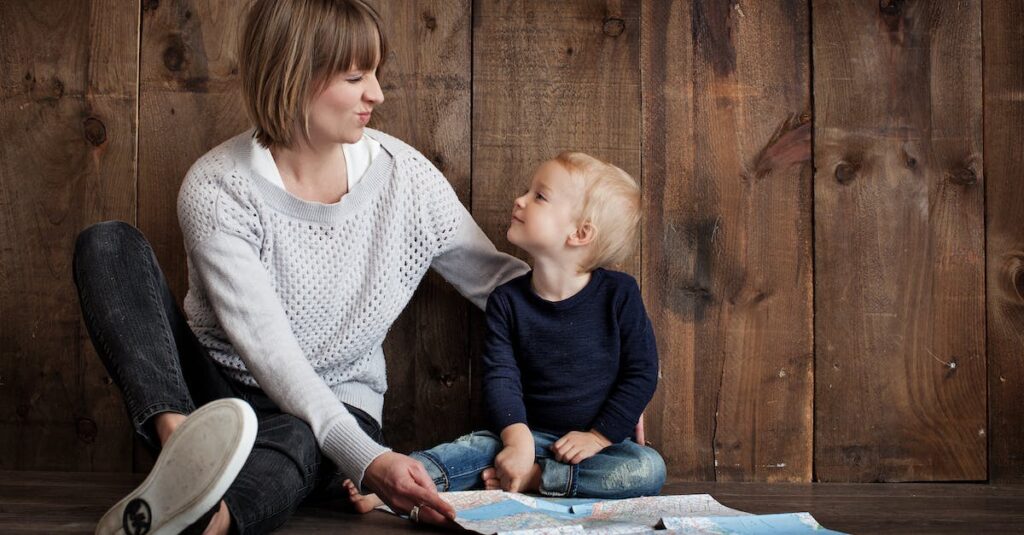Hey there! Have you ever heard the phrase, “You are your own worst critic”? It’s true! And as a mom, it’s our job to help our kids build their self-esteem to knock that critic out of the park.
One thing that’s important for us to remember is that self-esteem isn’t built overnight. It takes time, effort, and a lot of love. But don’t worry, I’ve got a few tips up my sleeve to help you along the way!
Firstly, make sure that you are praising your child’s efforts rather than their results. For example, instead of saying “You’re so smart,” say “I’m proud of how hard you worked on that assignment!”
Another great way to help your child develop self-esteem is by encouraging them to try new things. It can be scary to step outside of their comfort zone but the experience of succeeding, or even failing, can teach them valuable lessons about resilience and determination.
So let’s get started and show our kids just how amazing and capable they truly are!
Understanding the Importance of Self-Esteem

As a mom, one of the most important things we can do for our kids is to help them develop a strong sense of self-esteem. Self-esteem is the foundation for a happy and successful life, allowing our kids to believe in themselves and their abilities. Here’s why it’s so important:
- Confidence: When our children have self-esteem, they feel confident about who they are and what they can achieve. This confidence can be seen in their interactions with others and in their willingness to try new things.
- Healthy Mental Health: Kids with strong self-esteem are more likely to have healthy mental health, as they are better able to cope with life’s challenges and setbacks. They are more resilient and better equipped to deal with stress.
- Better Relationships: Children with self-esteem are able to form strong, positive relationships with others. They are able to communicate effectively and seek out healthy friendships and relationships.
- Success: Self-esteem is also important for success in school and beyond. Kids with strong self-esteem are more likely to try their best and take risks, which can lead to great achievements.
To help your kids develop self-esteem, it’s important to start early and work consistently to build it up. Encourage your children to try new things, praise their efforts, and help them learn from their mistakes. With your love and support, your child can develop the self-esteem needed to lead a fulfilling and successful life.
Teaching Self-Love and Acceptance

It’s important to remember that our children’s self-esteem begins with us. As parents, we need to model self-love and acceptance so our children can learn to love and accept themselves.
- Practice Positive Self-Talk: When we talk negatively about ourselves in front of our children, they may begin to adopt those same negative beliefs. Instead, practice positive self-talk in front of your children. For example, say things like, “I’m proud of myself for trying my best” or “I love my body just the way it is.”
- Praise Effort, Not Just Results: Children need to learn that their worth is not solely tied to their achievements. Praise them for their efforts, not just their results. For example, say things like, “I’m proud of you for working so hard on that project” or “I can see how much effort you put into practicing your soccer skills.”
- Teach Them to Set Realistic Goals: Encourage your children to set goals that are realistic and achievable for their age and abilities. Setting overly ambitious goals can lead to feelings of failure and inadequacy. Emphasize the importance of progress, not perfection.
- Encourage Unique Interests: Every child is different, with their own unique talents and interests. Encourage your children to explore their interests, whether it’s art, music, sports, or something else. This will help them feel valued and confident in their abilities.
- Create a Safe and Supportive Environment: It’s important to create a safe and supportive environment where your children feel comfortable expressing their thoughts and feelings. Encourage open communication and empathize with their struggles. By doing so, you’ll be showing them that they are loved and accepted, no matter what.
Teaching self-love and acceptance is a lifelong journey that begins in childhood. By modeling positive behavior and creating a supportive environment, we can help our children develop the confidence and self-esteem they need to thrive in life.
Setting Realistic Goals

As parents, we all want our kids to excel in everything they do. We want them to be the best at sports, the smartest in class, and the most talented in their hobbies. However, setting unrealistic goals can do more harm than good when it comes to our kids’ self-esteem. Here are some tips on setting realistic goals for your kids:
- Focus on Effort: Instead of focusing solely on the outcome, praise your child for their effort. For example, instead of saying, “you didn’t win the game,” say, “I’m proud of how hard you played and how you never gave up.” This will teach your kids that hard work and determination are more important than the outcome.
- Encourage Experimentation: Kids need to try new things to figure out what they are good at and what they enjoy. Encourage your child to try new activities, but also know when to pull back if it’s causing too much stress or frustration.
- Set Small Goals: Setting small, achievable goals can help build confidence and self-esteem. Help your child set goals that are challenging but not impossible, and celebrate their accomplishments along the way. This will teach them that success is not just about big accomplishments, but also about the small steps that lead up to those accomplishments.
Remember that every child is different, and what works for one child may not work for another. It’s important to listen to your child and support them in a way that works best for them. By helping your child set realistic goals, you can help build their self-esteem and set them up for success in the future.
Celebrating Successes

- Celebrate small successes: It’s important to celebrate every little accomplishment your child makes, no matter how small it may seem. Whether it’s getting an A on a test, learning a new skill, or even trying something new, acknowledging these accomplishments will help build your child’s self-esteem.
- Avoid comparing your child to others: When we compare our children to others, it can make them feel inadequate and diminish their self-esteem. Instead, focus on your child’s unique strengths and celebrate them. Encourage them to be the best version of themselves and let them know that their differences make them special.
- Encourage independence: Allowing your child to take on responsibilities and make decisions helps them develop a sense of independence and confidence in themselves. Start small by letting them choose what to wear, pack their own bag or decide what to have for dinner. As they grow older, gradually increase their responsibilities like doing their laundry or managing their own money.
- Be a positive role model: Children learn by example, so be a positive role model for your child. Model self-confidence, positive self-talk, and healthy self-esteem. Avoid negative self-talk and body shaming or putting yourself down in front of your children. Remember that your words and actions have a powerful impact on your child’s self-esteem.
Remember to celebrate your child’s uniqueness and encourage them to love themselves for who they are!
Avoiding Negative Self-Talk

It’s easy for kids to fall into the trap of negative self-talk, where they constantly put themselves down and focus on their flaws rather than their strengths. As parents, it’s important that we help our children avoid this harmful habit and learn to speak kindly to themselves.
- Encourage positive self-talk: Show your children how to speak kindly to themselves by modeling it yourself. Talk positively about yourself and encourage your kids to do the same. Give them examples of positive affirmations they can say to themselves, such as “I am capable” or “I am worthy.”
- Acknowledge their feelings: When your child is upset or feeling down about something, acknowledge their feelings and offer comfort. Let them know that it’s okay to feel sad or frustrated, but remind them that their worth as a person is not defined by one bad day or mistake.
- Avoid comparing: Avoid comparing your child to others or putting pressure on them to be like someone else. Emphasize their unique strengths and talents and help them find ways to develop those skills further.
- Focus on effort: Encourage your child to focus on the effort they put into things rather than just the outcome. Praising effort helps them build confidence and resilience and helps them see that hard work pays off.
- Avoid negative labels: Avoid labeling your child as “lazy” or “stupid” or any other negative terms. Such labels can stick and become part of their identity. Instead, focus on specific behaviors and help them work towards improvement without attaching a negative label to their character.
Helping our children develop positive self-esteem takes effort, patience and a lot of positive reinforcement. By avoiding negative self-talk and teaching our children to be kind and loving towards themselves, we set them up for a lifetime of healthy self-esteem and self-confidence.
Encouraging Positive Relationships and Support Systems

- Be a positive role model: Kids learn by observing and imitating their parents. So, it’s important to model positive self-talk, confidence, and self-care. This will encourage your child to do the same and develop a positive self-image.
- Encourage positive relationships: Being around positive and supportive people can have a huge impact on your child’s self-esteem. Encourage your child to spend time with friends and family who uplift them, and avoid those who bring them down.
- Celebrate their achievements: No matter how big or small, it’s important to acknowledge and celebrate your child’s achievements. This will boost their self-confidence and motivate them to achieve more.
- Help them set realistic goals: Setting realistic goals and achieving them can build your child’s self-esteem. Encourage them to set goals that are attainable, and help them create a plan to achieve them.
- Teach them coping skills: Life can be tough, and it’s important to teach your child healthy coping skills. Whether it’s taking a deep breath, going for a walk, or talking to a trusted adult, learning how to cope with stress and challenges can improve their self-esteem.
- Provide a supportive environment: Creating a supportive environment where your child feels heard and understood can make a big difference in their self-esteem. Encourage open communication, respect their feelings and opinions, and provide love and support no matter what.
By focusing on these tips, you can help your child develop a strong sense of self-worth and self-esteem, which will set them up for success in all aspects of their life. Remember, building self-esteem is an ongoing process that takes time and effort, but the rewards are well worth it.
Conclusion
In conclusion, helping our kids develop self-esteem is a journey that every parent should embark on. It’s not just about telling our kids how wonderful they are, but it’s about actively supporting them in their endeavors, cheering them on through their failures, and celebrating their accomplishments.
As we navigate this adventure, let’s remember to embrace the power of positivity and the impact of affirmations. Let’s teach our kids to focus on their strengths, celebrate their unique qualities, and build their confidence.
Remember, there’s no such thing as a perfect parent, and there’s no one-size-fits-all approach to raising confident kids. But by sharing our love, our encouragement, and our perspectives, we can help our little ones become the best versions of themselves.
So, let’s roll up our sleeves, let’s keep the laughter and fun coming, and let’s help our kids soar!





